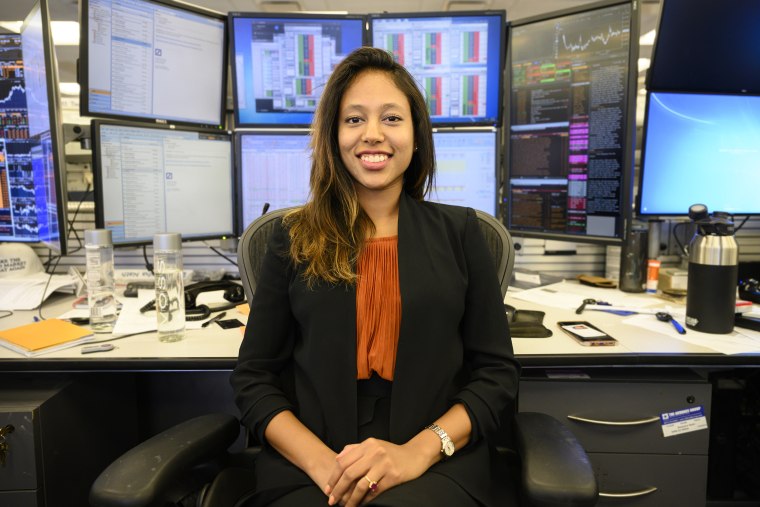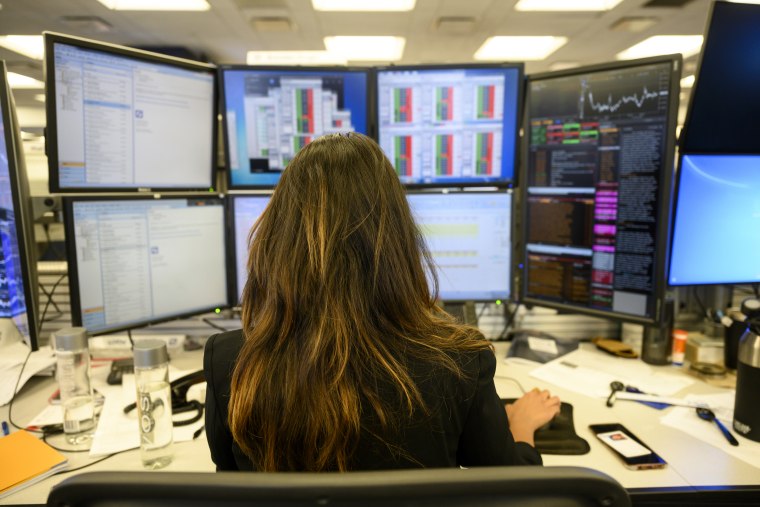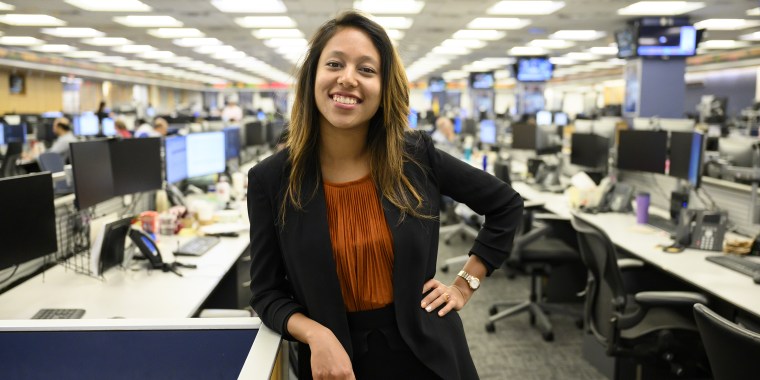“What do you do?” It’s the question you might get asked when you meet someone for the first time. We all have our go-to answer: I’m a lawyer, I work for a start-up, I teach preschool — but we actually want to know the details: When do you get in? How do you spend your day? Tell us, really: What do you do?
Meet Natasha Nath. At 29 years old, the vice president and U.S. rates options trader at Deutsche Bank is one of the youngest people working at her level in her field, at one of the world's largest investment banks and financial services companies.
Nath trades on behalf of the bank with some of the world's largest financial institutions — hedge funds, asset managers, insurance companies, pension funds, corporations — that are looking to get more liquidity, or more cash.

We tapped Nath to give us the hour-by-hour details of what her job is really like.
A day in the life of a trader
6:30 a.m. I wake up and look at how the U.S. dollar rates market traded overnight in Asia and Europe trading sessions. The interest rate dollar market is open almost 24/7 and because I trade several different products that have exposure to dollar rates, I'm just looking to see how the dollar is trading and if anything's going wild.
7:00 a.m. I get on the subway. During my commute, I read up on relevant news articles and research. I look at Financial Times, the top Bloomberg news articles that are relevant to my field and any research that's been published by Deutsche Bank.
7:20 a.m. I arrive at work. I work on a trading floor in the Deutsche Bank office on Wall Street. The large open space is set up with several rows of computer screens with traders and sales representatives lined up on each side in close quarters. It is an interactive, energetic and intense environment to work in. My desk is set up with eight monitors that I use to closely follow the markets, although I wish I had more!

7:30 a.m. Once at work, I set up the various tools that enable me to trade during the day including:
- Excel spreadsheets: I use these to price client trades and monitor the market.
- Electronic trading platforms: I use these to trade U.S. dollar rates products such as treasuries/treasury futures/swaps.
- Deutsche Bank systems: I use these to correctly model and book trades.
- Bloomberg terminal: I use this for communication with colleagues, clients, and interdealer brokers throughout the day. I monitor the pricing of various interest rate options products (like treasury bonds, mortgage bonds and interest rate swaps) on the exchanges in Chicago and in the interdealer broker market to get an understanding of how the market is trading. An interdealer broker market is basically where all of the different banks — like Goldman Sachs, Morgan Stanley, Bank of America, JP Morgan — are trading the same product as us. The banks are trading with each other and brokers are facilitating these trades.
8:30 a.m. My morning might be slow until around this time, which is when most economic data is released (which can be a market-moving event) and activity picks up.
9:00 a.m. Clients forward requests for pricing to my colleagues who work in the sales division. I work with them to model client trades. I discuss the risk on each trade with my colleagues on the trading desk and decide on appropriate pricing. The time between a client asking for pricing and them deciding to trade is anywhere between 1 minute and 20 minutes. If a client trades with us, I discuss with my colleagues and execute appropriate hedging strategies.
The market is fast-paced and I price anywhere from 50 to 100 client trades in a typical day. Every client trade is unique which keeps the job interesting. Because the product I trade is complex with risks in several orders, hedging the portfolio is challenging and always keeps me on my toes.
It sounds complicated, but you've probably heard the term "hedge your bets." It's like that. Basically, if you plan to make a trade, what is something that you can buy or sell to offset risk and protect yourself from the impact of the initial trade you did if the market moves in the opposite direction?

12:00 p.m. It can get very busy on the trading floor so I usually have my lunch at my desk. Thankfully, I have generous colleagues who will pick something up for me while on their lunch break!
12:30 p.m. I spend time after lunch pricing more client inquiries.
2:00 p.m. The afternoons can be slower than the mornings and I spend most of the time speaking to clients via Bloomberg chat or on the phone. I also spend time working with my colleagues in the sales division to point out interesting trade ideas or market trends to clients.
One thing this job has taught me to do is multitask. I'm doing so many things at the same time — I'm looking at eight different screens, pricing 20 different client inquiries at the same time and keeping track of where the market is.
4:30 p.m. I start closing down the books, wrap up any end-of-day hedges and work on closing my portfolio. I also set up for overnight risk.
5:00 p.m. Trading closes. I'm thinking about risk for the next day and what I should look at overnight.
5:30 p.m. I leave work for the day.
6:00 p.m. About once a week, I'll go meet up with clients for drinks or dinner because a lot of them will want to meet to go over some ideas. One of my sales colleagues will usually be there as well.
7:00 p.m. I monitor the market when the Asia session opens up in the evening. If the market conditions are wild, I will discuss overnight hedging strategies with my colleagues and execute overnight trades with the Deutsche Bank Asia and London desks to protect the portfolio further against market risk.
8:00 p.m. I disconnect more on nights when I take a workout class or see friends for dinner and drinks. I've been able to maintain good work-life balance in the sense that when I leave work I disconnect from the markets. I feel like that's a good way to keep myself sane because I'm so stressed out and adrenaline is high while I'm at work — I need to go back home, disconnect and have a chill evening so that I can come back in the morning with full force.

How does the day you've described compare to your standard day-to-day?
Every day depends on the market conditions and the economic calendar. Each day is unique because the markets are dynamic and our clients react to it differently every time. Trades and hedging strategies also keep changing depending on the market conditions. Whether it's Brexit or elections or the coronavirus, something always keeps me busy.
What skill should someone possess to do this job?
You have to be calm under pressure. Keep your cool when the going gets tough, when the market gets crazy, you need to be able to stay calm to make level-headed decisions about risk. For the specific product that I trade, you definitely have to have a mathematical background so you're able to understand the numbers. Finally, you have to be able to disconnect. You should really be on when you're at work and then switch yourself off so that your work isn't taking over your life completely.
Have there been any challenges you have experienced because of your age and gender, and how have you overcome that?
It definitely was challenging in the past to be the only woman on the trading floor at Deutsche Bank, but a lot of women have joined recently. So things are definitely looking up.
I think a lot of women are kind of intimidated just by the idea of finance. It's not as intimidating as you might think — at the end of the day it's a bunch of people just trying to work as hard as possible. I want to become the face of the trading floor, so hopefully I can encourage young women to explore it as a career option.
I'm definitely one of the few women, especially women of color, doing what I do, but I got very lucky in the sense that I'm working with a boss who's always supported me and given me the opportunity to excel.
If anything, I've been celebrated for being a woman. It helps me stand out in my field.

